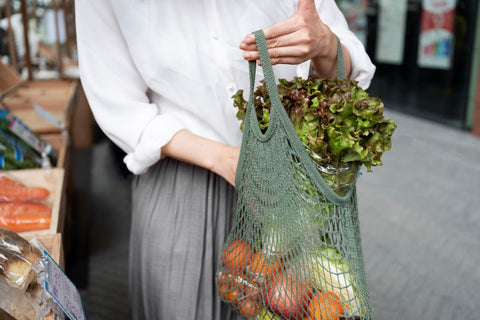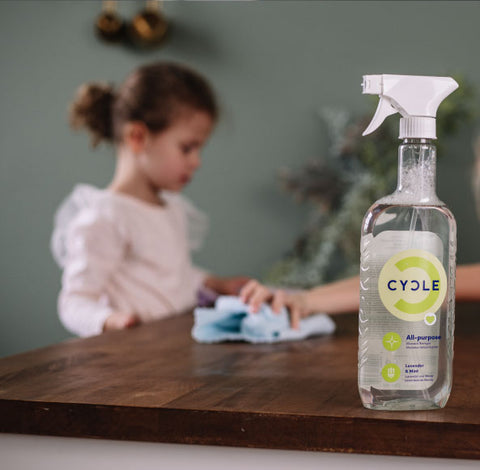Sustainable living is by no means an unattainable goal. On the contrary: it is a positive change that is within reach for all of us, and that will not only benefit the Earth, but also our health and even our wallets in the long run!
Fortunately, there are now more and more opportunities to start on the path to a greener lifestyle. In this article, we'll take a look around the different areas and show you how to get started.
Areas for green lifestyle change
Thanks to the developments and research of recent years, we can make so many aspects of our lives environmentally sustainable. And each of them has different levels and aspects, so there is plenty of opportunity to shape these steps ourselves! Let's look at where and how we can experiment:
Waste management
Proper management of the growing amount of waste is a key environmental issue. This includes reducing the amount of waste, recycling and using environmentally friendly methods!
The first and most important step in this category is selective waste collection. In Hungary, we can currently separate plastic, metal, paper and glass waste at household level, but we can also experiment with composting in various ways. If you don't have the possibility to collect organic waste at home, you can now join community composting schemes in a growing number of places. And with this app, we can share or take in green waste. And we can use the compost for our houseplants at home, but if we have a garden, it will pay dividends too.
This can be followed by minimising single-use products and purchasing reusable versions of such devices. Two simple, initial steps could be to purchase a canteen and coffee thermos instead of disposable solutions.
There are already countless additional options that can be purchased from packaging-free shops, webshops and trusted sources.
It's also important to be informed and familiar with innovative materials such as PLA, compostable plastic, packaging made from corn. When sorting these, it is important to dispose of PLA products in the municipal waste bin, as this is the only material that breaks down during industrial composting, which is not currently possible in this country.
Conscious purchasing choices, such as preferring packaging-free products, are also essential to minimise unnecessary waste. Visit your nearest packaging-free shop and buy your household products naked!
The recycling ofindividual objects and tools is a further step forward, allowing the reuse of useful materials, thus reducing the depletion of natural resources.
Catering
We may not even know how much our eating habits affect the environment. But eating consciously is also part of an environmentally friendly lifestyle.
For example, buying local and seasonal foods can be a first step, as they travel less distance from the farm to your table, reducing the environmental footprint of transport. Plus, nothing beats the high vitamin content of seasonal fruit and vegetables! It's best to get them from local markets.

The market always offers seasonal, fresh fruit and vegetables.
A vegetarian or vegan diet can also be effective, as reducing the consumption of meat and dairy products is a significant contribution to reducing the environmental impact of agricultural production.
When shopping consciously, we should also pay attention to minimising the packaging of food. This is where the packaging-free shop comes in again, where you can shop without waste. But the market is also a good option, as you can take your own reusable containers there. If you go to a supermarket, give priority to paper, glass and metal packaging.
If you put plastic in your shopping basket, choose recyclable forms of plastic: these are the packaging marked 1, 2 4, 5. You can read more about this here.
It is also important to manage food waste in an environmentally friendly way; composting allows part of the food waste to be reused as nutrients. Supporting local restaurants and markets is another way to make our food more sustainable and indirectly contribute to the development of local economies.
Transport
Our transport habits are a major contributor to our environmental impact, and conscious choices can help reduce our carbon footprint. The first step is to use public transport, such as buses, trains or subways.
But cycling and walking are also a great alternative that is not only environmentally friendly but also good for your health. Besides, there are more and more community car rental companies on the market, so it's worth getting to know them and taking advantage of their opportunities.
As for travel and holidays, include local destinations or destinations that can be reached by train, for example. Minimising unnecessary flights also contributes to healthy air and a sustainable future.
Dressing
Our clothing habits also have a significant impact on the environment, and conscious steps towards sustainable fashion can contribute to a greener lifestyle.
Let's start by focusing on quality instead of quantity. With timeless pieces, we can reduce the waste produced by fast fashion. It's also worth understanding the motivation behind our clothing purchases and buying things consciously and thoughtfully rather than on impulse.
Switching to second-hand clothesand repairing them is another sustainable option. Vintage or second-hand clothes not only add a unique style but also reduce the environmental impact of the textile industry.
Promoting ethical and sustainable, local fashion brands is also a priority. Favouring brands that pay attention to labour conditions, exclude exploitation and use sustainable production practices will contribute to the growth of fair trade fashion.
In addition to conscious shopping, it is also worth focusing on minimising textile waste. Careful maintenance of garments, donating or reusing unused clothes can all help to reduce textile waste overall.
Our electronic devices
To reduce our environmental footprint, we should look at our environment, both in terms of electronics and energy consumption.
When choosing electronics, it is important to consider products that are durable and easy to repair. Quality devices are not only more durable, but also produce less waste than models that become obsolete quickly and are difficult to repair. But when buying a new device, it is worth considering buying second-hand products and devices that are still in good working order. Browse such options on this website!
The purchase of energy efficient equipment is also key. Energy Star rated appliances tend to use energy more efficiently, reducing household energy consumption. Appliances in sleep mode or off mode also help to reduce consumption.
The management of electronic waste is also an important consideration. The management of e-waste requires special attention, as the substances it contains can be potentially harmful to the environment.
Household
We can shift our household activities and cleaning habits in a sustainable direction, starting by using environmentally friendly cleaning products. Fortunately, there are more and more of these trusted brands on supermarket shelves. What we should look for when choosing is natural ingredients. Products with high chemical content can often cause chemical allergies, which can affect not only the skin but even the lungs. You can read more about this in this article.
But feel free to try making your own cleaning products at home ! Use vinegar, baking soda, essential oils. Experiment with different recipes and find the one that works best for you, whether it's a descaler, a disinfectant or a All Purpose cleaner.
Watch Trendrakó's video of a vinegar - citrus descaler!
Water use
An environmentally responsible approach to water use is essential in our lives. There are many ways to reduce our water consumption and contribute to clean water. This is one of the reasons why the use of natural cleaning products, as described in the previous paragraph, is so important. Moreover, it is our aim to contribute to this. That is why CYCLE products are recycled cleaning products made from sustainable sources, including recycled water.
But there are other ways to avoid unnecessary water use! Install tap locks to prevent water leaks and filters that can help improve water quality so that you buy less bottled water.
This is followed by energy-efficient washing machines and dishwashers, which not only save energy, but also use less water overall than the average type.
As for the bathroom, cut down on bath time and get in the shower instead. To minimise the amount of water you use at this time, a good solution is to listen to your favourite 3-4 minute song to measure the time! Don't waste water when brushing your teeth.
Last but not least, we can also save water in our houseplants and gardens. Collect rainwater for irrigation, and your plants will be happier for it.
Leisure, programmes
You may not have thought so, but our leisure activities can be environmentally friendly, and this kind of conscious approach can help us to think about the environment as well as having fun.
Examples of environmentally friendly leisure activities include hiking, cycling, bird watching and other nature-based activities. Not only are they good for your immune system, they also bring you closer to nature. Prepare for these hikes with reusable, non-disposable items and take care not to litter!
Supporting local community events and programmes is also an opportunity for sustainability. Parks, arts events, and community initiatives often have a smaller environmental footprint while supporting the local economy.
Some cultural institutions, museums and arts venues also take sustainability into account. Green practices, energy efficiency measures and procurement can all contribute to a more sustainable future.
General economic aspects
Since we vote with our money, there are other general economic considerations to take into account when making purchases.
By supporting ethical and sustainable companies, we can help ensure that market demand is built on these values. Firms that are committed to environmental protection, ethical labour practices and social responsibility are helping to create a sustainable economy.

Support local, artisanal products!
It is important to remember that green lifestyle changes are not just about reducing consumption, but also about conscious shopping. Instead, choose durable products that will serve us for the long term and don't ignore the lifespan of products. Cheap items that wear out quickly often contribute to excessive waste and waste of resources.
By making informed financial choices and supporting sustainable businesses, the economic aspects of green lifestyle change also matter. By spending our money, we can support values that are consistent with environmental and social responsibility.
As you can see, there are so many areas where we can start to take green action. But here are some ideas to help us get started and stick to them!
Challenges and tips
Making a green lifestyle change is a gradual and conscious process, and it is worth starting with small steps. The first step might be to choose one or more of the areas listed here where you feel you can easily get involved.
This could be through separate waste collection, using more energy-efficient household appliances or even buying sustainable clothes. The aim is to go for the one that is easy for you to do and doesn't suddenly cause too big a change in your life.
In these processes, it is important to recognise that any new habit takes time to introduce and requires persistence. It takes around 30-40 days for new habits to become routine! So don't worry if you have difficulties at the beginning or if not every day seems successful. Forget the perfect word and be very patient with yourself! Processes ebb and flow and it is important to accept that there are good days and not so good days.
Support from the community can also help in introducing sustainable lifestyle habits. Setting goals with friends or family, for example, greatly increases the chances of success. Doing activities together not only motivates people, but also fosters a sense of community. Involving other people in the household can also be helpful. Shared responsibility and joint decision-making can strengthen commitment to sustainable living.
It's also important to note that we can go through periods at any time when our motivation is low and change is difficult. To get through these low points, it is important to look back at what we have achieved and remember why we started moving towards a greener lifestyle. With small steps, perseverance and a supportive community, these difficult times can be easier to get through.
CYCLE is a solution for a green lifestyle change
To achieve a green household, there are many effective tools and brands already on the market that can be easily integrated into our daily lives. At CYCLE , our aim is to offer effective cleaning products and to educate our customers towards a sustainable daily life.
All our products are made from natural ingredients, minimising the environmental impact of toxins. But CYCLE is not just about clean living. We're behind an innovative development that sees our products made using recycled organic materials and recycled water.
Plus, their bottles are made from recycled and recyclable plastic.
Our new generation of eco cleaning products are just waiting to make your sustainable everyday life easier.

Click here to browse our products on our website!
Subscribe to our newsletter today to stay up to date with the latest
news and promotions! After subscribing, you can buy your first CYCLE cleaning product with a 10% discount
.
The way to a sustainable everyday life
When making the green lifestyle change, it is worth bearing in mind that there is no one right way. But a few simple steps can make a huge difference to our environment and our well-being. Keep in mind that we should strive for the happy medium.
Don't burden yourself with unnecessary expectations and don't try to change everything at once. Rather, let 's start with small steps and let the process become an organic part of our daily lives in a comfortable and enjoyable way.
Let this change be a joyful way of life instead of a duty!




















